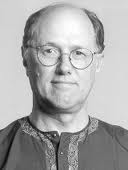 Nelson Mandela a Master of “Soft Power”
Nelson Mandela a Master of “Soft Power”
by George Wolfe
I recently returned from New York City where I spoke and performed at a conference on Human Dignity at Columbia University. It was during the conference on Thursday afternoon that we heard of Mandela’s passing. Although his death was somewhat expected, I felt as though a great soul had just departed from the midst of our company.
That evening, New York flutist Chris Layer and I dedicated our improvisatory performance in Milbank Chapel to Nelson Mandela, creating an atmosphere that was lamenting yet peacefully reflective.
There are few people more qualified to speak about Nelson Mandela than the former ambassador to South Africa, James Joseph, who now teaches at Duke University. In 2004, while I was serving as director of the Ball State Center for Peace and Conflict Studies, and after hearing Ambassador Joseph lecture at Chautauqua Institution, I invited him to speak at Ball State University for the Martin Luther King Jr. annual lecture.
The title of the ambassador’s lecture was “What I learned from Nelson Mandela.” He explained that there are two kinds of power: “hard power and soft power.” Hard power makes use of coercion and intimidation, whereas soft power uses persuasion and understanding. According to Ambassador Joseph, Nelson Mandela was transforming as a leader because he was a master at using soft power.
In the 1950’s, Mandela was a passionate revolutionary who led armed protests against the human rights abuses of the apartheid government in South Africa. He was eventually arrested, convicted of treason against the apartheid government, and spent twenty-seven years in prison. Throughout the 1980s, domestic protests, increased international pressure, and economic sanctions convinced the white South African government to release Mandela, negotiate an end to apartheid, and hold free elections. In 1994, elections were finally held, and the African National Congress and Nelson Mandela emerged to lead the new South Africa.
There remained, however, a serious risk of civil war among competing tribal groups. Rather than seek punishment and vengeance, Mandela chose the path of forgiveness and set an example no one who had suffered less than him could stand against. He used his persuasive influence to establish, along with Archbishop Desmond Tutu, the South African Truth and Reconciliation Commission.
By forgiving those who had condemned him as a political prisoner, Mandela convinced South Africans to tell their stories of human rights abuses, and then move beyond hostilities to end division and suspicion. As he insisted in his inaugural address, “We must, therefore, act together as a united people, for national reconciliation, for nation building, for the birth of a new world.”
Mandela was a master at using soft power. His calm and persuasive leadership enabled his country to avoid a bloody civil war. South Africa had been reborn.
George Wolfe is the Coordinator of Outreach Programs for the Ball State University Center for Peace and Conflict Studies. He is also a trained mediator and the author of The Spiritual Power of Nonviolence: Interfaith Understanding for a Future Without War.


